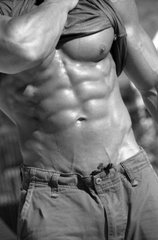A sample meal schedule might look something like this:
6:30 Breakfast
9:30 Snack
12:30 Lunch
3:30 Snack
6:00 Dinner
9:00 Small Snack
This method will have a profound impact on fat loss.
2. Calories Count -- When the most successful bodybuilders prepare to get very lean for a show, their goal is to eat as much as possible while still losing fat. For example, if I can get you to lose 1 to 2 pounds of fat per week on 1,400 calories per day, I’m on track. If I try to accelerate the process and lower your calories to 1,200, I sabotage your efforts. Anything more than a 2-pound loss per week will strip muscle tissue and give one a soft look.
A good example is the person who goes on a crash diet and ends up thin but still soft and flabby when they get to their goal weight. This takes place because they lost not only fat, but also valuable muscle. They lowered calories too much, lost too fast and did not try to eat the optimal amount of calories for fat loss.
Still don’t think the correct amount of calories matter?
I receive many e-mails from people who have been on low-calorie diets. Many complain that after four to five weeks of weight loss, they hit a sticking point.
Why does this happen? The T3 (thyroid hormone) and body temperature are reduced. It's subtle and you may not realize that body temperature is reduced, but that will slow down the speed of the metabolism. To avoid this slow down, a slight increase in calories is essential. This helps to increase and optimize thyroid levels.
I'm not suggesting everyone should increase calories if they hit a sticking point. In many cases, some people aren't being consistent, or their diet isn't as low calorie as they think.
If and when a bodybuilder experiences this type of sticking point based on calories being too low for too long of a period, they’ll increase daily calories or even bump up calories every fourth day by 300 to 400 (this is referred to as calorie cycling).
Again, eat the optimal amount of food to lose fat.
3. Eat Breakfast -- A balanced breakfast comprised of carbohydrates, protein, and a little fat is a critical start to the day. The point of consuming breakfast is that it "breaks" the "fast" from an overnight sleep. In addition, breakfast will rev up the metabolism for the rest of the day. You won’t find a bodybuilder on the planet that skips breakfast. This is your first opportunity of the day to get blood sugar back to a balanced state after the all night fast and is critical for sustaining fat loss.
4. Ratios count! A calorie is not a calorie -- Do you know those people who tell you to simply lower your calories to lose fat? The people who never mention protein, carbohydrates or fats? They’re wrong. Protein, carb and fat ratios are important. The correct ratios (which can vary depending on an individual’s response to food) help to stabilize blood sugar levels, which helps to increase energy and fat loss. Generally, 40 percent to 50 percent of carbohydrates, 25 percent to 30 percent protein and 20 percent to 30 percent of healthy fats is the best starting place.A bodybuilder will lower carbs a bit as a contest approaches, but will also take in enough carbs for energy and muscle fullness. If carbs are too low, the muscle tends to not look as tight. Protein is also critical to build and retain muscle tissue, which in turn helps to burn more fat.
Finally, good dietary fats are extremely important. They help to balance hormonal levels, increase strength and create satiety (fullness). If you’re looking for a plan that takes this into account I recommend eDiets GI plan (Glycemic Impact diet).
5. Weight Training -- To affect muscle versus fat ratios you have to weight train. Contrary to popular believe, bodybuilders don’t workout with weights for two hours a day. Most bodybuilders are aware that after about 45 to 60 minutes, catabolic (muscle wasting) hormones begin to wreak havoc. An intense weight workout lasting no more than 60 minutes is the most efficient route to go. You don’t have to workout with a bodybuilding routine, but you do need to work the entire body approximately three alternate days per week.
If fat loss is not taking place, the bodybuilder will add a bit more to the session to stimulate fat loss. Most people would jump up to 60 minutes. However, the bodybuilder will add time slowly and monitor fat loss. The key is perform all that is necessary -- and no more than that.
In many cases, the bodybuilder will not increase time, but will increase intensity. This is accomplished by incorporating interval cardio training (integrating slower levels of intensity for several minutes with very high levels for several minutes). Intervals are great for boosting the metabolism.
Many people think they need to perform two hours of cardio per day. Nothing could be further from the truth. Start with a realistic amount of cardio per day and then add to it by five minutes or switch to intervals if you haven’t lost body fat in two weeks. This is assuming that you’re eating enough calories.
7. Water Intake -- From the standpoint of water intake and fat loss, you want to be in a position where the liver is converting stored fat to energy. The liver has other functions, but this is one of its main jobs. Unfortunately, another of the liver’s duties is to pick up the slack for the kidneys, which need plenty of water to work properly (more than most people realize).If the kidneys are water-deprived, the liver has to do the work of the kidneys along with its own (lowering its total productivity in the process). The liver then can’t metabolize fat as quickly or efficiently. If you allow this to happen, you’re setting yourself up to store fat because you've made the liver less efficient at turning stored body fat to energy. Usually if you multiply .55 times your weight, that should be enough in ounces of water to suffice. Water is the underrated fat loss tool.
8. Discipline -- This is the seldom used word in the fitness industry. You’ll read a lot about the new magic workout, the new magic diet, the machine that’s sure to burn fat off your butt, etc. It’s all a bunch of nonsense.
A bodybuilder works out even when he/she doesn’t feel like it; stays on the diet even when he/she feels like going off it. It’s about doing the right thing and the hard thing at times. One day of discipline leading to another day of discipline. You build your body and your mind simultaneously. Without this, every point I’ve made above is fruitless. The good thing is anyone can do it -- if they choose to.


















No comments:
Post a Comment